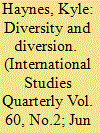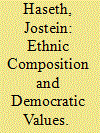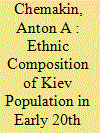| Srl | Item |
| 1 |
ID:
184868


|
|
|
| 2 |
ID:
146198


|
|
|
|
|
| Summary/Abstract |
How does a state’s ethnic composition affect its propensity to engage in diversionary conflicts? Recent empirical work examines the political conditions under which domestic unrest compels an embattled leader to initiate conflict abroad. We remain uncertain, however, of what social or demographic characteristics make states particularly prone to diversionary behavior. This article tries to address this gap, examining whether a state’s ethnic structure conditions its leader’s response to domestic discontent. Combining the expansive literatures on ethnic politics and diversionary war yields conflicting expectations here. I find that ethnically fragmented states are significantly more prone to initiating diversionary conflicts, and I show that the greater availability of “conflict opportunities” resulting from transborder ethnic-kin groups, in part, drives this effect. A brief case study illustrates these dynamics.
|
|
|
|
|
|
|
|
|
|
|
|
|
|
|
|
| 3 |
ID:
190079


|
|
|
|
|
| Summary/Abstract |
There is a rich literature on public support for democracy. However, few have investigated the link between ethnic composition and citizens’ desire for democracy. In this study we investigate the relationship between ethnic fractionalization and democratic attitudes in 91 countries in the period 1995–2014. We test this on a measure of public desire for democracy. The main independent variables are a time-variant ethnic fractionalization index and an index of ethnic polarization, based on time-series data from the Composition of Religious Ethnic Groups project. We make use of hierarchical modeling combining country- and individual-level data in order to approach this gap in the research. The main finding is that homogeneous societies show the largest degree of desire for a democratic society within established democracies while increased fractionalization and especially increased polarization is associated with a smaller desire for democracy.
|
|
|
|
|
|
|
|
|
|
|
|
|
|
|
|
| 4 |
ID:
189849


|
|
|
|
|
| Summary/Abstract |
It is only recently that international relations experts have come
to recognize the “importance of social processes of identity
formation, culture and ideology… for the study and practice of
world politics” (Lawson, 2006, p. 3). An analysis of common historical
experience of various groups of people united—or divided—by social
and political practice may help us find the root causes of modern crises
and ways to overcome them.
|
|
|
|
|
|
|
|
|
|
|
|
|
|
|
|